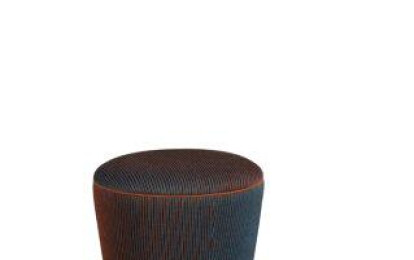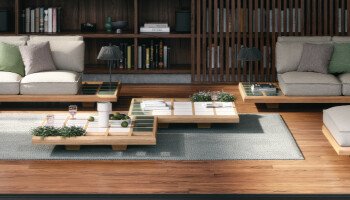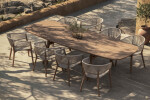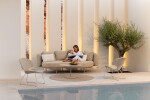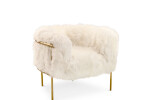Wood has served man from the very earliest times, now being an irreplaceable material for many applications and branches of industry. It was already in the antiquity that natural wood was found to be rather flexible, and also easy to bend and shape when exposed to heat.
The origins of the bentwood furniture industry are associated with the name of Michal Thonet, a German carpenter of Rhineland, who in the early nineteenth century started exploring the ways of bending beech wood. He made sitting furniture from bent components using hydrothermal treatment and steel tape. Thonet improved its invention by introducing new technical solutions into the manufacture of bentwood furniture compared with the production of, for example, joined chairs. He increased the strength of furniture by replacing its glued connections with screw joints. He learnt how to form furniture into various shapes by exposing wood to water vapour and discovered that by leaving bent components to dry in the mould (template) they can permanently be shaped as desired while remaining stronger than conventional furniture.
Fabryka Mebli Giętych (Bentwood Furniture Factory) was established in 1881, when Josef Hoffman built a small bentwood furniture factory in Jasienica on a trade route from Warsaw to Vienna. The factory blossomed in 1890-1913, expanding and repeatedly multiplying its production capabilities. In the early twentieth century, Mundus, an Austrian bentwood furniture corporation with Josef Hoffman among its shareholders, also built its factories in Jaworze and Buczkowice. In 1923 the company merged with Thonet Brothers to market both companies’ products worldwide under the shared Thonet-Mundus logo.
Devastated during the Second World War, the factory in Jasienica was first nationalised and then incorporated into one state-run enterprise after another to continue from 1 January 1956 as an independent manufacturer called Bielskie Zakłady Przemysłu Drzewnego w Jasienicy, after taking over the furniture and wood processing works in Buczkowice, Jaworze and Rajcza. In 1959 the company was renamed to Fabryka Mebli Giętych w Jasienicy.
The factory’s privatisation was started in 1993, when it was converted into a state-owned limited liability company and accepted into a National Investment Fund Programme.
The next stage of privatisation took place in 1997, when the Leading Fund and the remaining National Investment Funds sold the shares they held to Paged SA Group, which acquired a controlling interest in the Company, also by repurchasing some shares from employees.
As a member of the Paged Group, in 2000 Paged Fabryki Mebli based in Jasienica was selected to take over and consolidate the other existing partner companies of the furniture industry into one furniture manufacturer and vendor.
In August 2005 Paged Fabryki Mebli Sp. z o.o. merged with Paged WEFEM SA to expand its operations to the production of dining room, living room, bedroom and study furniture.
In 2005 Paged Kontrakt is founded in Poznań as a provider of furnishings for public utility facilities (hotels, restaurants, pubs).
July 2006 saw the last stage of consolidating the furniture companies: Paged Fabryki Mebli Sp. z o.o., Jasienica, Paged Meble SA, Jasienica, and Paged-Rzeszowskie Fabryki Mebli SA, Sędziszów Małopolski, into one big furniture manufacturer and vendor.
In addition, the incorporation of the furniture companies gave Paged-Fabryki Mebli Sp. z o.o. direct control over the subsidiaries of the companies taken over:
- Buk Ltd (formerly Polish Timber Products Ltd)
- Woodways Imports
- Oldbuk Ltd (formerly Buk Ltd)
- Paged Kontrakt Sp. z o.o.
- Zumcontract Inc
In August 2006 Paged Fabryki Mebli Sp. z o.o. was renamed to Paged Meble Sp. z o.o.
In September 2006 Woodways Sp. z o.o. was acquired. Premium furniture designed for residential use (dining rooms and bedrooms) are offered under the Woodways brand.
In April 2007 Paged Meble Sp. z o.o. was converted into Paged Meble SA based in Jasienica.
In August 2007 buildings were taken over and modern machinery was purchased on the site of the former Jarocińska Fabryka Mebli SA. Thus, Paged Meble SA became the owner of the factory’s brand, patterns and tradition.
The purchase of a factory in Jarocin was the next step in the reorganisation of the furniture segment. The large and modern factory enabled to centralise the production from a number of smaller works. The Jarocin factory manufactures chest furniture for dining rooms, bedrooms and living rooms; in addition, the factory can extend its range of products to include study and hotel furniture.
In September 2007 Paged Kontrakt Sp. z o.o. was merged with Meble Jarocin-Biura i Hotele Sp. z o.o. (the surviving company). The products offered by Paged Kontrakt, i.e. furniture for the so-called contract market (hotel, restaurant, cafe, conference room and similar furnishings), will be complementary to the offerings of Meble Jarocin, which distributes premium hotel and study furniture. As a result, Meble Jarocin-Biura i Hotele Sp. z o.o. will be able to provide furnishings for hotels and other public utility facilities and become the legal successor of the Meble Jarocin brand.
Recommended Similar Brands
Projects with Products from Paged Meble S.A.
Our Products are Used in Projects by
Is this your brand? Contact Archello to claim it and manage your brand page.
